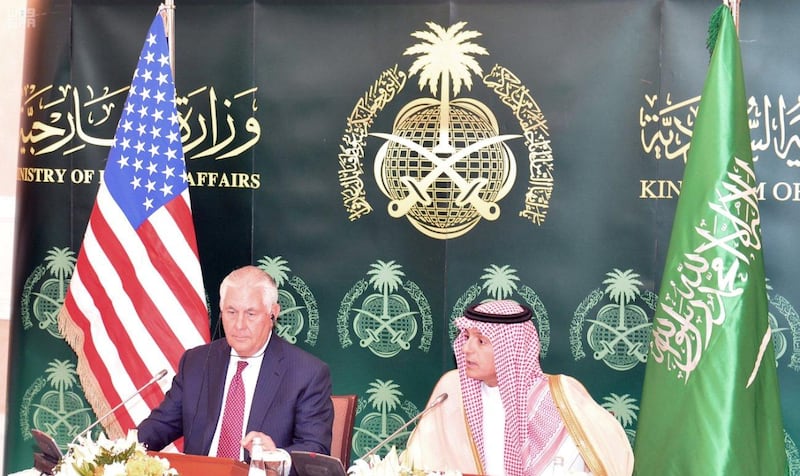US secretary of state Rex Tillerson warned global companies that they do business with Iran’s Revolutionary Guards “at their own risk,” remarks that will add to investment uncertainty in a country hoping to reap the economic benefits of a 2015 nuclear accord.
Mr Tillerson, visiting Saudi Arabia to help inaugurate an alliance against Iran between the kingdom and Iraq, called on governments to join a US sanctions regime against the Islamic Revolutionary Guard Corps (IRGC), a hard-line military and political force.
“Both of our countries believe that those who conduct business with the Iranian Revolutionary Guard, any of their entities - European companies or other companies around the globe really do so at great risk,” Mr Tillerson said at a briefing with the Saudi foreign minister Adel Al Jubeir.
The Revolutionary Guards “foment instability in the region and create destruction in the region”, Mr Tillerson said.
He travelled to the region as part of the Trump administration’s push to drum up support to confront Iran and keep it from filling the void in Iraq, now that ISIL has been driven from its strongholds there. Part of that effort included helping inaugurate a new Saudi-Iraqi council that will assist with Iraq’s reconstruction.
His comments signalled that the administration, while leaving the landmark 2015 accord intact for now, will increase economic pressure by other means to punish Iran for its alleged sponsorship of terrorism and development of ballistic missiles.
The US president Donald Trump announced a new Iran strategy October 13, refusing to certify the 2015 deal between the Islamic Republic and world powers. But instead of repudiating the deal, he asked Congress to change it to to ensure it counters Iranian political influence in the Middle East and announced more sanctions on the IRGC.
In turn, the US wants European allies - the UK, France and Germany - to get on board with strengthening the nuclear accord and extend some restrictions that are set to expire in 2025. The comments appear to be aimed at forcing US allies to make a choice: do business with Iran, with its economy of US$393 billion, or the $19 trillion US economy.
____________
Read more:
Second post-sanctions Airbus aircraft joins Iran fleet
Boeing confirms sale of 80 planes to Iran
____________
The US Treasury department has designated the IRGC as a supporter of terrorism for its backing of the Quds Force, which conducts operations outside Iran. Iran has frequently argued that it is notseeing economic benefit from sanctions relief it was granted under the nuclear agreement, and Mr Tillerson’s comments may only exacerbate that concern.
Many businesses, including Boeing, Airbus and General Electric, have ventured into Iran. Boeing is scheduled to begin initial deliveries next year for the first of 80 aircraft ordered by Iran Air under a deal valued at $16.6bn before customary discounts. Boeing is still completing licensing for a $3bn pact with Iran Aseman Airlines.
Mr Tillerson’s sanctions comments appeared to contradict statements he and Mr Trump had made in recent days that it was safe to do business in Iran. Speaking to Fox Business News on October 20, Mr Trump said he had told European allies to “just keep making money”.
“Don’t worry - we don’t need you on this one,” Mr Trump said in the interview.
A senior state department official, who asked not to be identified, said the administration was making a distinction between investment in IRGC-linked entities and those not tied to the group.
Even so, the IRGC controls huge swaths of Iran’s economy, and groups such as the American Enterprise Institute and the Foundation for Defence of Democracies argue that the chief executive of Aseman is linked to it, for example.
Mr Tillerson spoke at the briefing after helping convene the first meeting of the new alliance between Saudi Arabia and Iraq. He said the Saudi Arabia-Iraq Coordination Council “highlights the strength and breadth as well as the great potential of the relationship between your countries”.
“Improved Saudi-Iraqi relations definitely is a positive,” said Rob Malley, the vice president for policy at the International Crisis Group and President Barack Obama’s Middle East adviser. “But it is a pipe dream to think that Iran’s influence in Iraq isn’t going to remain preponderant.”
Tillerson will also visit Pakistan, India and Switzerland on the current trip.






